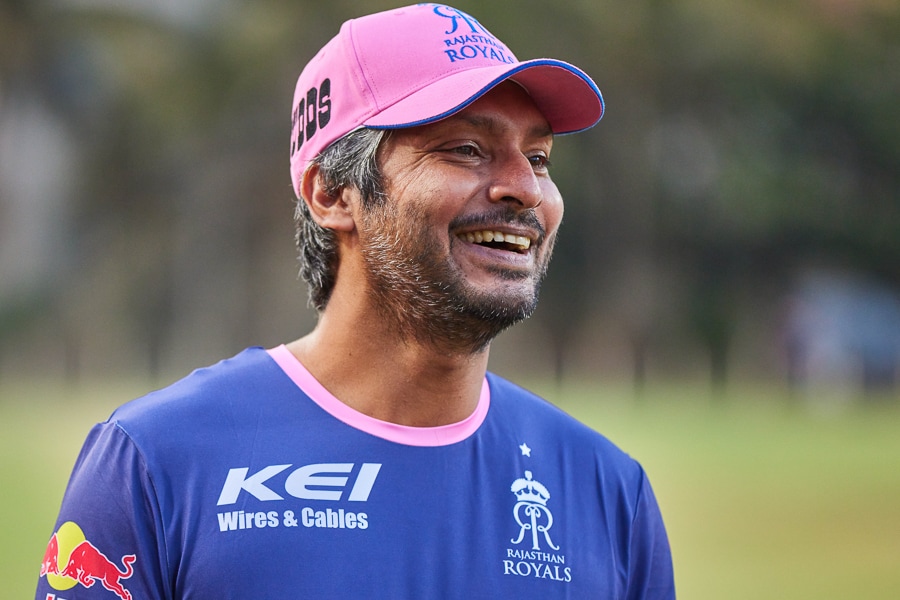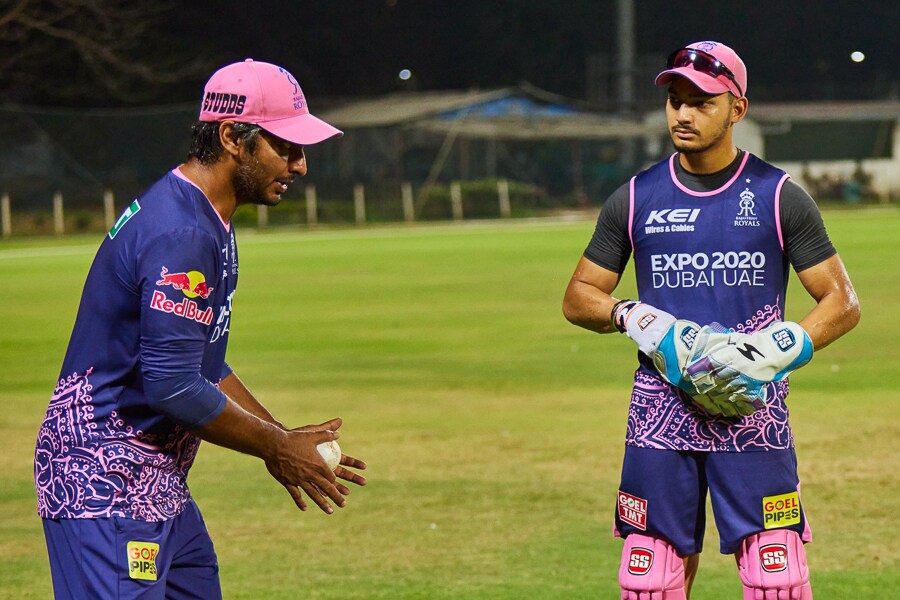Victory belongs to the team, defeat to the captain: Kumar Sangakkara
The Sri Lankan cricket legend and now the director of cricket for Rajasthan Royals, on the leadership lessons he has learnt from the cricket field


 Image: Rajasthan Royals
Image: Rajasthan Royals
You’ve joined the Rajasthan Royals (RR) following a disappointing season where the team finished bottom of the table. What are some of the changes you are looking to introduce for a turnaround?
Last season was interesting because it was a really close tournament. I was watching it from the outside as a commentator. It was just a game’s difference between finishing in the play-offs or finishing at the bottom. It speaks volumes for the quality of cricket in the IPL that you really don’t have much to separate the top four sides from the rest of the pack.
Although at the start of this season you have your usual suspects for the top four, our job at Rajasthan Royals is to change that and become part of that group. At this stage, you can’t make a complete overhaul—there is a structure in place and you have to work within that to fine tune it. We’ve got a lead assistant coach in Trevor Penney and some new choices at the auction. [What we’ve got to do] is set in place a culture of honest, open communication, a culture where making a mistake is absolutely fine as long as the intent aligns with the strategy, and allow the players a brand of cricket that plays to their individual as well as the team’s strength. There will be no mixed messages, and we’ll play a cricket that’s straightforward and unencumbered.
RR has a new captain, this time in Sanju Samson, who will have to lead senior international stars like Ben Stokes, Jos Buttler etc. What would be your advice to Samson in terms of approaching the role?
First of all, Sanju has to be himself. He can’t try to copy others. He’s a very mature young man with amazing cricketing abilities. Besides, he has grown up with RR, having been with the team since 2013, so he knows the dynamics between Indian and international players very well.
Sanju needs to be authentic about what he believes in and how he thinks the franchise should play. Leading players like Stokes, Buttler, [Chris] Morris, [Jofra] Archer, is really about being clear and having an open communication. The great thing about these international players is they don’t overpower people with their presence just because they are international superstars. It’s a collaborative process and they are very receptive to that, so it’s not really hard to lead them.
For Sanju, it is also important to separate roles: When he bats, he is Sanju Samson the batsman, and when he’s fielding, that’s when he really dons his captain’s hat. His leadership quality is in how he goes about his training, his communication, work ethic and these will help in bringing the team together and identifying him as the clear leader. The two things he needs to do: Be himself and empower his team. You may be the best captain in the world, but without the team following you, you can’t get the job done. I think it wouldn’t be difficult for Sanju at all—he’s a guy who doesn’t talk much but likes to get things done.
What are the key attributes of being a leader? Is someone a born leader or can you grow into a leader?
There are certain characteristics that you are born with that enable you to become a leader, but without learning and refining those and understanding that leadership is not about yourself but also others, you can’t be a true leader. You’ve got to understand that engendering leadership in others makes your job easy it’s really difficult to have others follow you otherwise.
Leadership is about stewardship and service—it’s about making others better. And your role as a leader starting from being a prominent one doing a great job goes into the background, because you would have enabled people to be better. That is the key to leadership. It’s important because a lot of these players who are playing under you will leave you or move to another franchise, but they will carry lessons that they would have learnt from Sanju beyond RR or cricket itself. On the cricket field, when players know that you genuinely care about their improvement, that’s when real trust starts and performances improve.
Finally, leadership, for me, is always about taking responsibility. When you win, it’s others, and when you lose, the captain should be able to step up and say ‘I am accountable’.
A leader, be it on the cricket field or in a corporate set-up, often has to take decisions that are fraught with risks of failure. How does one get the better of such apprehensions and act decisively?
A leader has to make decisions—sometimes on the spot, or sometimes on the basis of experience, data, statistics and information. If you are afraid of making a mistake, it becomes difficult to make decisions that are positive or that sometimes need a calculated risk. You need to dissociate yourself from being paralysed, because in crunch situations the key is to make that decision and not overthink it. When you are faced with decision-making, make practical, proactive decisions that meet not just the needs of the moment, but also anticipatory awareness of what might happen down the line.
While making a decision, you have to accept that there can always be a chance of failure. In cricket, when I started, one of the first pieces of advice I got was that the only guarantee you’ll have as a batsman is that you’ll fail. But once you are aware of the risks, that’s when you strategise and pick the right people to do the job for you. Sometimes, your decision isn’t vindicated, but that’s the nature of leadership. You learn and move on. The fear of failure is natural in all of us. What it can’t do is paralyse you.
 Image: Rajasthan Royals
Image: Rajasthan Royals
IPL teams come together for just a few months. How do you build a cohesive team culture within that short period?
That’s one of the things that RR also needs to change. You need to have year-round connections, dialogue and plans for your players so that in between IPLs they still feel a part of the RR family. There need to be plans put in place for them, depending on the seasons past, that makes them better players when they come back for the next season. You can’t leave them in isolation from season to season, then it’s almost like starting anew. This is especially true for younger Indian players, to have a centre of excellence where they can go and train and be given specific practice and fitness plans. Over time, this gels you into a unit that not only functions well, but is also successful.
It also helps understanding each other as people—we all come from different backgrounds, countries, cultures, we think differently. It’s important for a team to understand why players are who they are as people. That understanding can be built when the conversations are not just about cricket. You can’t have a disconnect between your senior international and your junior local player. Little, subtle changes in attitude or mindset can go a long way towards improving how players view each other and come together on the field as a team. Your attitude helps you be a valued member of a team. Of course attitudes can be different—some are more reflective, some are expressive, more forceful, some are prudent—but everyone has their place. When there is a challenge, you stay together than break away.
No two cricketers, or individuals for that matter, are said to be alike. As a leader, how do you galvanise a diverse sort?
Valuing individuality is important. You can’t have 11 of the same people in your side with the same attitudes and functionalities. You need to bring those diverse mindsets, opinions and characters into the mix and then understand how you can motivate them. Some people need clarity, some need an emotional connect, some need to be valued and appreciated, some need to be given logical explanations. The key is to not barrage them with too much information or instructions. It is getting their ideas and getting them to contribute to team strategy so that each one has a sense of ownership and motivation to achieve that goal.
Once you create that individual space within a team, it becomes a lot easier to execute a plan that we’ve all been a part of creating. That becomes difficult when you keep telling people what to do and expect them to follow. Leadership is about making your team members lead themselves and also others in tough situations, because leadership is usually situational. Even though you are the nominated captain, there can be a situation where you play no part in the game. Like when you are dismissed while batting--there are two people out in the middle who have to take on the mantle of leadership.
You are the first non-British president of the MCC, considered the custodian of the game. How do you see the game of cricket evolving from here over the next decade or so?
A decade is a long time given the evolution we have seen in the past in terms of the shorter versions of the game. We’ve seen a huge uptake and appetite for the T20 format, we have seen various franchise tournaments coming in, there has been a constant discussion about Test cricket and its place and primacy, how you can be relevant as a format, the different kinds of mindsets and needs when they consume sport, even the platforms on which they are broadcast as many are switching to streaming. England has taken a step towards free-to-air broadcast which is great so that more and more people have access. It’s a complicated place right now and the debate goes on. You’ll never find a perfect balance. But you need to find a balance that works not just for the players and the administrators but also for the fans because they decide what works and what doesn’t. And cricket and cricketers will have to evolve based on that.
First Published: Apr 09, 2021, 11:20
Subscribe Now